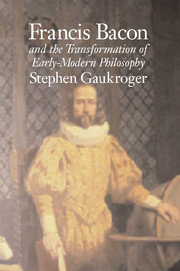Book contents
- Frontmatter
- Contents
- Acknowledgments
- References to Bacon's works
- Prologue
- 1 The nature of Bacon's project
- 2 Humanist models for scientia
- 3 The legitimation of natural philosophy
- 4 The shaping of the natural philosopher
- 5 Method as a way of pursuing natural philosophy
- 6 Dominion over nature
- Conclusion
- Bibliography
- Index
Prologue
Published online by Cambridge University Press: 12 January 2010
- Frontmatter
- Contents
- Acknowledgments
- References to Bacon's works
- Prologue
- 1 The nature of Bacon's project
- 2 Humanist models for scientia
- 3 The legitimation of natural philosophy
- 4 The shaping of the natural philosopher
- 5 Method as a way of pursuing natural philosophy
- 6 Dominion over nature
- Conclusion
- Bibliography
- Index
Summary
Cicero tells us that Cato had applied himself to philosophy, not that he might dispute like a philosopher, but that he might live like one. Bacon quotes this remark on a number of occasions, and it invokes a conception of philosophy that dominated not just antiquity but also the early-modern era. It is a conception according to which there is a way of engaging intellectual, cultural, moral, scientific, and aesthetic problems which is not only distinctive, marking out the philosophical treatment of these problems from that of the theologian or the statesman or the artist, for example, but whereby the philosopher is someone who has a particular standing, a particular claim to be heard. Rightly or wrongly, the scientist has now largely usurped much of this role from the philosopher – it is now the scientist, rather than the philosopher, who lays claim to a ‘theory of everything’, for example – and although this shift was consolidated only in the nineteenth century, the influence of Bacon has been such that it is to him, more than anyone else, that we must trace its origins. For it is Bacon who, more than anyone else, urges and guides the transformation of philosophers into what later came to be known as scientists, inducing the birth of a new discipline quite different from philosophy as traditionally practised, and leaving not just philosophy, but the humanities generally, with the problem of forging a new identity for themselves.
From the time of his death in 1626 onwards, Bacon's fortunes have risen and fallen dramatically.
- Type
- Chapter
- Information
- Publisher: Cambridge University PressPrint publication year: 2001



